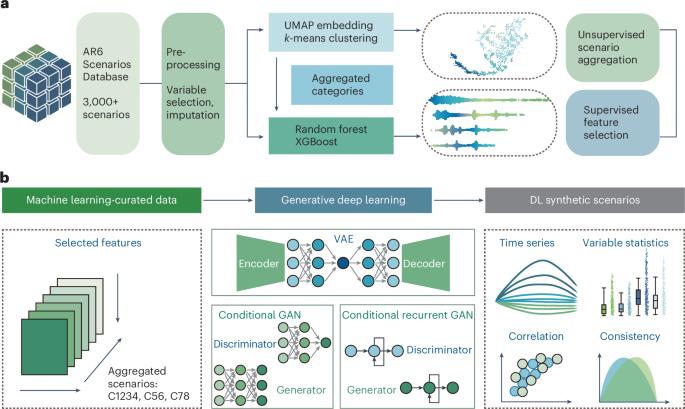Using deep learning to generate key variables in global mitigation scenarios
IF 27.1
1区 地球科学
Q1 ENVIRONMENTAL SCIENCES
引用次数: 0
Abstract
Integrated assessment models (IAMs) are the dominant tools for projecting mitigation scenarios. However, IAM-based scenarios often face challenges such as modelling biases and large computational burden. Here we develop a deep learning framework to generate key variables through synthetic mitigation scenarios aligned with the Sixth Assessment Report (AR6) Scenarios Database. By analysing 1,202 scenarios from a diverse set of IAMs, we select key drivers that enable a more detailed sectoral representation. Next, we trained three generative deep learning models to produce 30,000 synthetic scenarios at low computational cost across various IPCC AR6 climate categories, replicating variable distributions and correlations while also demonstrating physical consistency in power sector variables through internal validation checks. We found that the variational autoencoder achieved the highest label transferring accuracy among three frameworks. This study illustrates the potential of deep learning to complement IAM approaches and provides a basis for handling complex mitigation scenario generation tasks. Integrated assessment model-based scenarios are commonly used to project future emission pathways but suffer from submission biases and high computational cost. Here researchers develop a deep learning framework to generate synthetic scenarios and replicate key variables across a wide range of mitigation ambitions.


利用深度学习在全球缓解情景中生成关键变量
综合评估模型是预测缓解情景的主要工具。然而,基于iam的场景经常面临建模偏差和大量计算负担等挑战。在这里,我们开发了一个深度学习框架,通过与第六次评估报告(AR6)情景数据库相一致的综合缓解情景生成关键变量。通过分析来自各种iam的1202个场景,我们选择了能够实现更详细的部门表示的关键驱动因素。接下来,我们训练了三个生成式深度学习模型,以低计算成本在各种IPCC AR6气候类别中生成30,000个合成情景,复制变量分布和相关性,同时通过内部验证检查证明电力部门变量的物理一致性。我们发现变分自编码器在三种框架中获得了最高的标签传输精度。本研究说明了深度学习补充IAM方法的潜力,并为处理复杂的缓解情景生成任务提供了基础。
本文章由计算机程序翻译,如有差异,请以英文原文为准。
求助全文
约1分钟内获得全文
求助全文
来源期刊

Nature Climate Change
ENVIRONMENTAL SCIENCES-METEOROLOGY & ATMOSPHERIC SCIENCES
CiteScore
40.30
自引率
1.60%
发文量
267
审稿时长
4-8 weeks
期刊介绍:
Nature Climate Change is dedicated to addressing the scientific challenge of understanding Earth's changing climate and its societal implications. As a monthly journal, it publishes significant and cutting-edge research on the nature, causes, and impacts of global climate change, as well as its implications for the economy, policy, and the world at large.
The journal publishes original research spanning the natural and social sciences, synthesizing interdisciplinary research to provide a comprehensive understanding of climate change. It upholds the high standards set by all Nature-branded journals, ensuring top-tier original research through a fair and rigorous review process, broad readership access, high standards of copy editing and production, rapid publication, and independence from academic societies and other vested interests.
Nature Climate Change serves as a platform for discussion among experts, publishing opinion, analysis, and review articles. It also features Research Highlights to highlight important developments in the field and original reporting from renowned science journalists in the form of feature articles.
Topics covered in the journal include adaptation, atmospheric science, ecology, economics, energy, impacts and vulnerability, mitigation, oceanography, policy, sociology, and sustainability, among others.
 求助内容:
求助内容: 应助结果提醒方式:
应助结果提醒方式:


